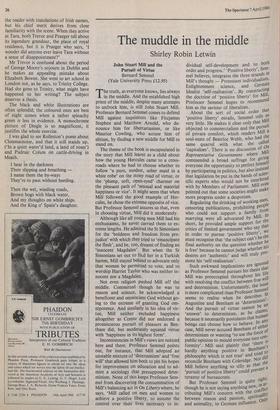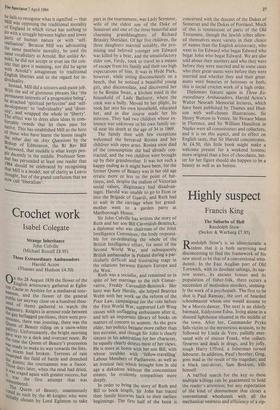The muddle in the middle
Shirley Robin Letwin
John Stuart Mill and the Pursuit of Virtue Bernard Semmel (Yale University Press £12.95) he truth, as everyone knows, lies always
.1 in the middle. And the established high priest of the middle, despite many attempts to unfrock him, is still John Stuart Mill. Professor Bernard Semmel comes to defend Mill against inquisitors like Fitzjames Stephen and Matthew Arnold, who de- nounce him for libertarianism, or like Maurice Cowling, who accuse him of elitism, by finding a new middle for Mill to stand on.
The theme of the book is encapsulated in the story that Mill learnt as a child about how the young Hercules came to a cross- roads where he had to choose whether to follow 'a pure, modest, sober maid in a white robe' on the stony road of virtue, or the 'plump, soft, open-eyed' charmer on the pleasant path of 'sensual and material happiness or vice'. It might seem that when Mill followed the good example of Her- cules, he chose the extreme opposite of vice. But Professor Semmel assures us that, even in choosing virtue, Mill did it moderately.
Although like all young men Mill had his enthusiasms, he never carried them to ex- treme lengths. He admired the St Simonians for the 'boldness and freedom from pre- judice' with which they tried to 'emancipate the flesh', and he, too, dreamt of finding an 'innocent Magdalen'. But when the St Simonians set out to fir.d her in a Turkish harem, Mill stayed behind to advocate only that women be permitted to vote, and to worship Harriet Taylor who was neither in- nocent nor a Magdalen.
Not even religion pushed Mill off the middle. Committed though he was to reason and science, he acknowledged a beneficent and omniscient God without go- ing to the extreme of granting God om- nipotence. And similarly in his idea of vir- tue, Mill neither excluded happiness altogether as Comte did nor endorsed a promiscuous pursuit of pleasure as Ben- tham did, but moderately equated virtue with 'happiness in its highest form'.
Inconsistencies in Mill's views are noticed here and there. Professor Semmel points out, for instance, that Mill adopted an unstable mixture of 'determinism' and 'free will' that allowed him both to pin his hopes for improvement on education and to ad- mire a sociology that presupposed deter- minism. None of this keeps Professor Sem- mel from discovering the consummation of Mill's balancing act in On Liberty where, he says, 'Mill called on men and women to achieve a positive liberty, to assume the control over their lives necessary to in- dividual self-development and to both order and progress.' Positive liberty', Sem- mel believes, integrates the three strands in Mill's thought — Protestant individualism,
Enlightenment science, and German Idealist 'self-realisation'. By constructing
the doctrine of 'positive liberty' for Mill, Professor Semmel hopes to recommend
him as the saviour of liberalism. About the sort of social order that 'positive liberty' entails, Semmel tells us very little. He makes it clear only that Mill objected to commercialism and the pursuit of private comfort, which renders Mill a
soul-mate of Beatrice Webb, who had the same quarrel with what she called 'capitalism'. There is no discussion of 0.n, Representative Government where commended a broad suffrage for giving everyone the opportunity to perfect himself by participating in politics, but also insisted that legislation be put in the hands of scien- tific experts who would not be interfered with by Members of Parliament. Mill even pointed out that some societies might make more progress under a despotism. Regulating the drinking of working Men, censoring publications, prohibiting People who could not support a family from marrying were all advocated by Mill. In short, he provided ample support for the critics of limited government who say that in order to pursue 'positive liberty% we must recognise that 'the subject can't be the final authority on the question whether he is free' because he cannot judge whether his desires are 'authentic' and will trulY pro-
mote his 'self-realisation'. Such awkward implications are ignored as Professor Semmel pursues his thesis t' at Mill was preoccupied throughout his life with resolving the conflict between free will and determinism. Unfortunately, the issue is more complicated than Professor Semmel seems to realise when he describes St Augustine and Bentham as 'determinists •
And the pursuit of virtue cannot be an 'answer' to determinism, as he claims'
because it necessarily postulates that human beings can choose how to behave. In anY case, Mill never accused Bentham of either_
determinism or wanting `to use the force of public opinion to mould everyone into coil" formity'. Mill said plainly that °there 15
hardly anything positive in Bentham philosophy which is not true' and tried to
reconcile Bentham with Coleridge. Nor did Mill believe anything so silly as that the 'pursuit of positive liberty' could prevent a
tyranny of bureaucrats. But Professor Semmel is quite rightst.
though he is not saying anything new, in a. tributing Mill's concern with the confhet between reason and passion, spiritualitY
and animality, to German influence. OtilY
he fails to. recognise what it signified — that Mill was opposing the traditional morality of England in which virtue has nothing to do with a struggle between higher and lower Parts of human nature or with 'self- realisation'. Because Mill was advocating the same pantheist morality, he used the same vocabulary as Arnold. But unlike Ar- nold, he did not accept or even see the con- text that gave it meaning, nor did he agree With Arnold's antagonism to traditional English liberties and to the regard for in- dividuality. Instead, Mill did a scissors-and-paste job. With the aid of glutinous phrases like 'the Permanent interests of a progressive being', he attached 'spiritual perfection' and 'self- development' to 'individuality' and 'diver- sity', and wrapped the whole in 'liberty'. The effect was to dress alien ideas in com- fortable tweeds that let them pass for native. This has established Mill as the hero of those who have learnt the lesson taught the other day on Any Questions by the Bishop of Edmonton, the Rt Rev Bill Westwood, that muddle is what keeps peo- ple decently in the middle. Professor Sem- mel has persuaded at least one reader that 1984 should be celebrated by recognising that Mill is a model, not of clarity, as Leavis thought, but of the grand confusion that we now call 'liberalism'.











































 Previous page
Previous page